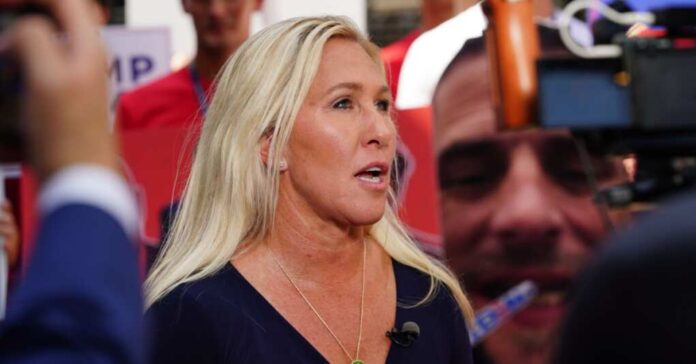During a session on Wednesday, Rep. Marjorie Taylor Greene (R-Ga.) used her experience of being banned on Twitter (now rebranded as X) to express her opposition to proposed legislation that could potentially ban TikTok.
“I stand before you today as the sole member of Congress who has experienced a ban by a social media platform,” Greene declared on the House floor amid deliberations over the bill.
She explained her ordeal, “Twitter, an American company, not one under Chinese ownership, barred my personal account. An account I used for campaigning, fundraising, and engaging with my constituents through the exercise of free speech, informing them that I was a choice in their ballot.”
In January 2022, Greene was suspended from Twitter for spreading misinformation about COVID-19. However, she was reinstated in November 2022 after Elon Musk acquired the company and reinstated several banned accounts, including former President Donald J. Trump.
Greene expressed concerns over the bill, suggesting it “is a gateway to unforeseen troubles,” metaphorically likening it to “opening Pandora’s box.”
Greene, who is known to be an ally of former US President Trump, has criticized Facebook and its CEO, Mark Zuckerberg. Trump, who had previously threatened to ban TikTok during his presidency, recently spoke against the bill that he believed would unfairly benefit Facebook and Zuckerberg, who expressed interest in buying the company.
Greene highlighted concerns over social media’s role in election integrity, specifically targeting Zuckerberg and Facebook for their controversial involvement. “The debate on election influence via social media platforms cannot exclude the actions of Mark Zuckerberg and Facebook,” she remarked. Facebook banned Trump following the January 6, 2021, attack on the Capitol. Additionally, it was disclosed that they also silenced information regarding the news about Hunter Biden’s laptop.
She raised a critical point about the bill’s implications for TikTok’s ownership, questioning the app’s future stewardship. “The crucial question remains—who will take over if ByteDance divests? Are we prepared to entrust someone like Mark Zuckerberg with the data of over 170 million Americans? My trust certainly isn’t with him,” Greene concluded, voicing concern over data privacy and control in the wake of such a significant potential change.
Greene wasn’t the sole Republican opposing the ban. Rep. Nancy Mace (R-SC) also voiced her dissent, stating, “I’ve been against this from the very beginning before anyone else weighed in. It’s the libertarian in me. It’s not the government’s role to ban apps from the App Store. Nowhere in our Constitution does it say that.”
Mace further criticized the ban, asserting, “Banning TikTok is beating the same drum as other communist countries controlling what content we are able to see.” According to Mace, the government should not be given any additional authority to regulate social media platforms.
The proposed bill targets TikTok’s parent company, ByteDance, compelling it to divest and sell the popular social media application due to privacy concerns linked to alleged ties with the Chinese Communist Party. Critics, including ByteDance, argue that the bill effectively equates to an app ban and raises concerns about freedom of speech.
In a statement describing Mace as a “staunch advocate for digital rights and individual freedoms,” she cautioned against the repercussions of a TikTok ban, including “the threat of a surveillance state and a step toward increased government control and socialism.”
Despite objections, the bill garnered support from both Democrats and Republicans, passing in the House of Representatives with a vote of 352 to 65. If ratified by the Senate and signed into law by President Joe Biden, the legislation would “incentivize divestment of TikTok” by excluding it from mobile app stores and granting executive branch powers to target social media companies linked to foreign adversaries. President Biden has publicly expressed his commitment to signing the legislation into law if it is passed by Congress and delivered to his desk.

















